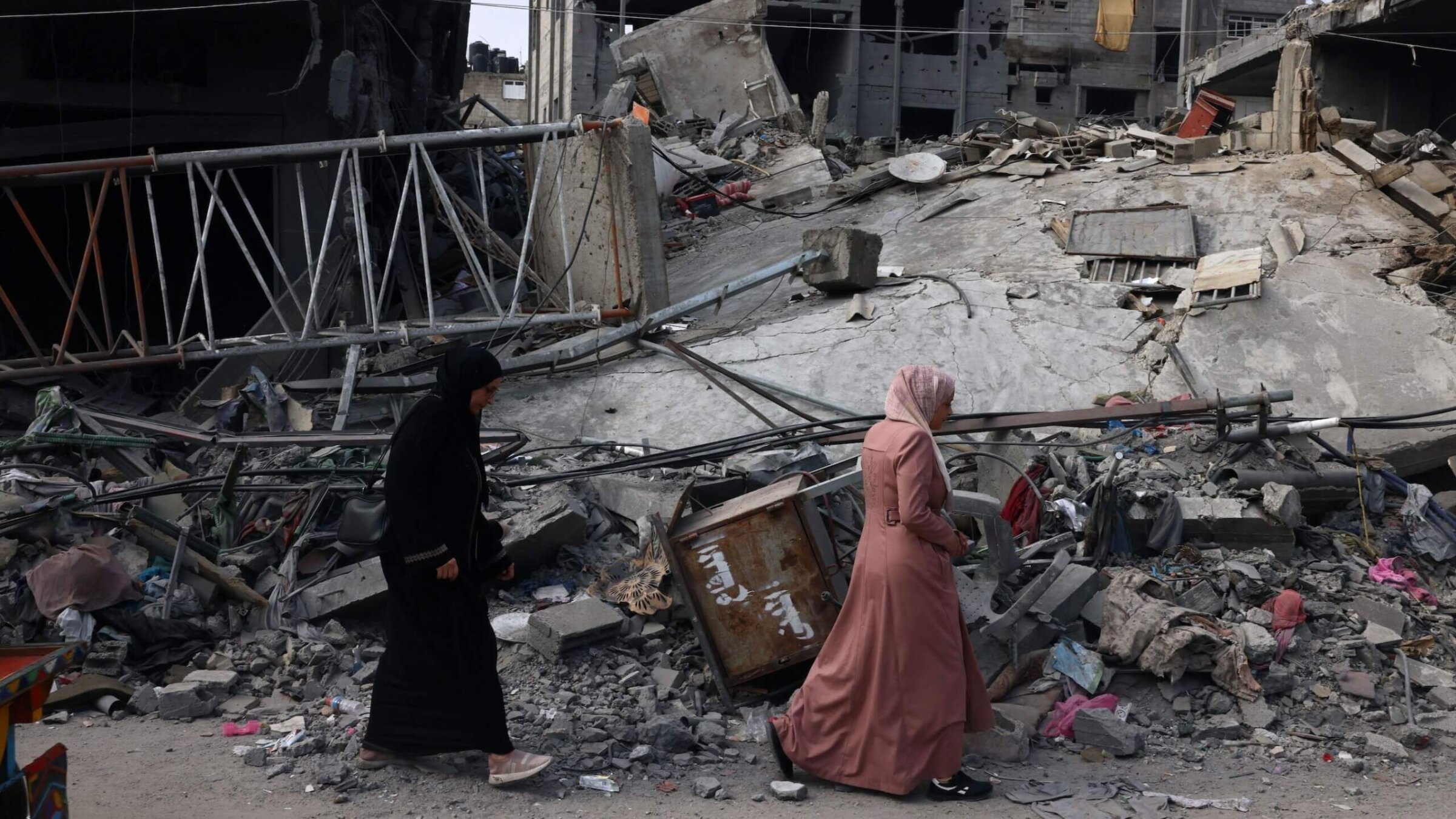Israeli forces on ground in Gaza, where communications blackout and airstrikes combine to create ‘worst night’ ever
“There is no service or connection, but I’m still alive till now”

Women walk past a destroyed building in the aftermath of Israeli bombing in Rafah in the southern Gaza Strip on Saturday. Photo by SAID KHATIB/AFP via Getty Images
Israel’s chief military spokesman said that Israeli troops and tanks spent more than 12 hours overnight operating inside the Gaza Strip, the longest incursion since the war started with the Hamas terror attack that killed more than 1,400 people in southern Israel on Oct. 7.
Israel’s aerial bombardment of the coastal Palestinian enclave also escalated on Friday night, according to news reports, though specifics were scarce because wireless and cell connections went dark, leaving journalists and citizens inside Gaza unable to document what was happening. On Saturday morning, The New York Times reported that some Gazans were able to post briefly on social media, quoting one who said on Instagram, “There is no service or connection, but I’m still alive till now,” and another who wrote: “We lived the worst night in the history of Gaza.”
The Hamas-run health ministry in Gaza has said that about 7,000 people there have been killed in the war before Friday’s escalation.
Meanwhile, in New York, the anti-Zionist group Jewish Voices for Peace flooded Grand Central Terminal during Friday’s evening rush hour, with hundreds of protesters calling for a cease-fire forcing the MTA to close the terminal. Gothamist reported that the New York Police Department took some 200 people into custody during the protest.
“No more weapons, no more war, ceasefire’s what we’re calling for!” they chanted.
“I am a child of Holocaust survivors,” one of the protesters, Jane HirschmaNn, was quoted as saying. “I grew up understanding that ‘never again’ means everybody, not just for Jews, but for everybody. And Palestine right now is very important, that we Jews stand up and say ‘no, not in our name, stop the genocide, stop the killing.’”
In Israel, families of the more than 200 Israelis being held hostage in Gaza said they expected to meet Saturday night with Prime Minister Benjamin Netanyahu and Defense Minister Yoav Gallant.
Rear Adm. Daniel Hagari, chief spokesman of the Israel Defense Forces, did not say whether the full-scale ground operation that Israel has been threatening for three weeks had begun or if this was just the latest in a series of short operations inside Gaza. Nor did he say if Israel had cut off mobile-phone and wireless internet service.
Humanitarian aid groups like World Health Organization, Doctors Without Borders, UNICEF and the Palestinian Red Crescent all said they’d lost contact with their staff inside Gaza overnight. The United Nations, which had voted overwhelmingly on Friday for a resolution demanding a cease fire, said fuel supplies inside Gaza were nearly exhausted.
“We are at a tipping point,” the head of the U.N.’s World Food Program posted on X, the platform formerly called Twitter. “Humanity must prevail.”
Hind Khoudary, a Gaza-based journalist, posted on X: “This is the most terrifying night I ever experienced in my life.”
A handful of Red Alert sirens inside Israel sounded on Saturday, signaling ongoing rocket fire from Gaza, the Times of Israel reported. The IDF also reported exchanging fire with terror groups in southern Lebanon.
There was also a report that a settler had fatally shot a Palestinian in the occupied West Bank.
A message from our Publisher & CEO Rachel Fishman Feddersen

I hope you appreciated this article. Before you go, I’d like to ask you to please support the Forward’s award-winning, nonprofit journalism so that we can be prepared for whatever news 2025 brings.
At a time when other newsrooms are closing or cutting back, the Forward has removed its paywall and invested additional resources to report on the ground from Israel and around the U.S. on the impact of the war, rising antisemitism and polarized discourse.
Readers like you make it all possible. Support our work by becoming a Forward Member and connect with our journalism and your community.
— Rachel Fishman Feddersen, Publisher and CEO

























